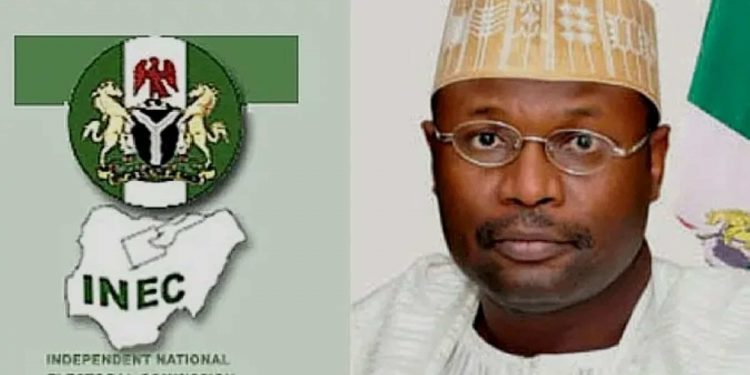The Independent National Electoral Commission (INEC) has waded into the speculations about the concept of “placeholder” that recently emerged in the media space and the possibility of substitution of running mates of the presidential candidates of the political parties.
Placeholder became an issue when some of the political parties were said to have submitted names of running mates for the presidential candidates in a hurry in other to beat the INEC deadline of 17th June 2022.
By INEC regulation, parties were to submit their candidates and running mates before this deadline or risk disqualification from the presidential election holding in February 2023.
However, the same INEC guideline also provides a window for substitution of these running mates, even after submission. This gives a second chance to the parties to get things right even if a candidate or the running mate was submitted in error or for temporary purpose, or if a party just wish to drop the candidate for whatever reason.
Last minute negotiations and deep considerations made it difficult for some of the parties to settle on their best foots to put forward as running mates before this INEC deadline, after the conclusion of their convention.
The Labour Party (LP) for instance submitted the name of Dr Doyin Okupe, the Director General of the Peter Obi Campaign Organisation, who is the presidential candidate of the Party.
Dr Okupe declared openly on a local television channel that he was only “standing in” for now until a more suitable candidate is selected by the party after an ongoing negotiations to form a large coalition with other political parties and groups.
Similarly, the All Progressive Congress (APC) on the same day, penultimate to the deadline, chose one Kabiru Masari from Kastina State, the younger brother of Aminu Masari as the running mate for Senator Ahmed Tinubu, the APC presidential flag bearer.
Following the selection of Kabiru Masari, there was and still wide speculation that his name was submitted also as a “placeholder” for another more suitable candidate for the position of Tinubu`s running mate.
However, Clariform cannot independently confirm this speculation and neither the Kabiru Masari, Senator Tinubu or the APC National Chairman, who spoke on this development recently have personally confirmed this speculation.
Speaking at the statehouse in Abuja on Monday, the APC National Chairman, Abdulahi Adamu categorically said that such speculations should be dismissed.
However, he also noted that the party had acted strictly on legal advice on everything they have done in relation to the submission of the name of the running mate to INEC.
Reacting to questions from statehouse reporters, he said that the party “is not in the speculative world. We are governed by the laws of the land. There’s nothing our presidential candidate has done with regards to returning his forms that is not within the confines of the law of the land,”
“Everything we’ve done so far, we have done very carefully with legal consultation and we are cocksure, we’re not going to have the kind of speculation that you are professing at this point in time.
“We’re very comfortable with what we have done. It is still pessimism. However, not in that school of thought yet. We don’t have to be there.” Adamu concluded.
However, the possibility and the legality of substitution of a candidate`s running mate has been explained by the INEC spokesman, Mr. Festus Okoye, who only technically dismissed “placeholder” as a word, but not as unlawful, even though he claims that it “has no place in our constitutional and legal framework”.
Mr. Okoye who spoke on two local television programs on Monday, which were both monitored by Clariform reporters, stated that the concept of a “placeholder is a unique Nigerian invention”, which is unknown to the electoral laws.
In direct contrast to this claim, the INEC spokesman further explained that the candidate of a political party, which includes the running mate can be substituted or changed if the candidate personally writes to the Commission withdrawing from the race.
He also said that such written withdrawal application must be accompanied with a sworn affidavit explaining the circumstances of withdrawal.
Also, that the application and affidavit must reach INEC within the deadline provided by the Commission. The “sworn affidavit stating that he is withdrawing from the race within the time frame provided by the law”. He said.
NOTABLE QUOTATION
Speaking further, he said: “The constitution makes it very clear that you cannot run alone as a presidential candidate and must nominate an associate to run with you for that position, and as far as INEC is concerned, the presidential candidates have submitted their associates to run with them in the presidential election,”
“As far as we are concerned, there’s no form submitted by the presidential candidate where they said ‘we’re submitting this person’s name as a place or space holder’.
“The issue of space or place holder is a unique Nigerian invention that has no place in our constitutional and legal framework.
“Political parties’ candidates have submitted names of associates to run with them, and that is the position of the law as at today and nothing has changed.
“For there to be a substitution of a candidate, the vice-presidential candidate must write to INEC, with a sworn affidavit stating that he is withdrawing from the race within the time frame provided by the law. That’s the only way there can be a substitution of candidates.”
TAKEAWAY
The concept of “placeholder” is lawful and known to the electoral laws. However, what is clear even from the explanation of the INEC spokesperson, Mr. Festus Okoye is that the term is not used in our laws.
Nevertheless, the concept is a permissible practice under the extant electoral laws and constitution of the land.
The only revelation from the clarification made by Mr Okoye is that the substitution of a running mate must not be made without the consent of the candidate, who must personally write the Commission that he/she is withdrawing from the race.
Also, that a withdrawal application made to this effect must be accompanied with a sworn affidavit explain the circumstances of the withdrawal and must reach INED within the time provided by law.












